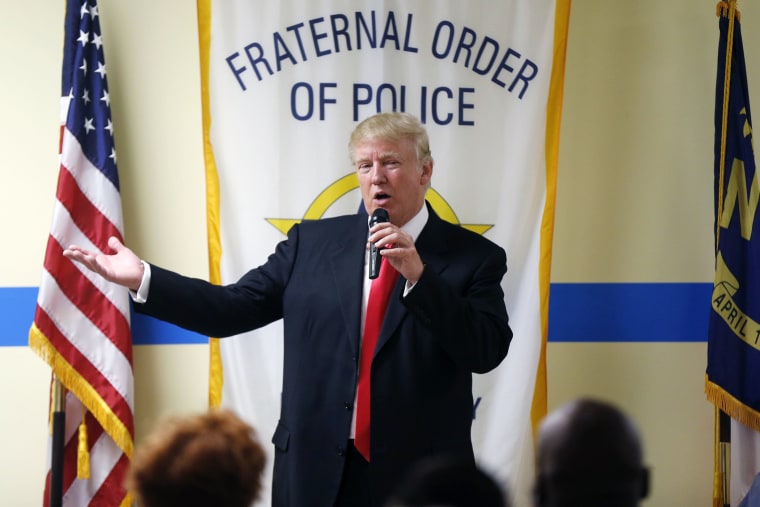Rudy Giuliani obviously made quite a bit of news during his Fox News interview last night, but the high-profile member of Donald Trump's legal defense team made a comment about law enforcement in passing that's lingering in important ways.
In context, Giuliani was talking to Sean Hannity about the $130,000 hush-money payment that Michael Cohen, the president's personal attorney, made to porn star Stormy Daniels shortly before the 2016 election. As part of his explanation about what transpired at the time, Giuliani added:
"The settlement payment, which is a very regular thing for lawyers to do. The question there was, the only possible violation there would be: Was it a campaign-finance violation? Which usually results in a fine, by the way, not this big stormtroopers coming in and breaking down his apartment and breaking down his office."
Now, on a substantive level, it's extremely unlikely that the FBI raided Michael Cohen's home and office over a campaign-finance violation. Indeed, the fact that the raid happened at all suggests Trump's lawyer is in serious legal jeopardy for reasons that go beyond the Daniels payoff.
But putting that aside, since when do Republicans refer to federal law enforcement officials as "stormtroopers"?
In fact, it's been a difficult week in GOP politics for law enforcement. For example, the president yesterday renewed his threats to politicize the Justice Department. The day before, Vice President Mike Pence celebrated a convicted criminal as "a tireless champion" of "the rule of law." The day before that, Deputy Attorney General Rod Rosenstein defended the Justice Department against what he sees as "extortion" efforts from congressional Republicans.
Last week, meanwhile, Trump, who's been railing against federal law enforcement for months, delivered a manic rant on national television, condemning "the corruption at the top of the FBI."
And it's not just the executive branch. Sen. Ron Johnson (R-Wis.), who oversees the Senate committee on domestic security, recently appeared on NBC's "Meet the Press" and made clear he's not especially pleased with Special Counsel Robert Mueller's investigation. "My concern with Special Counsel Mueller is he's so close to the FBI," the Republican lawmaker argued before complaining about the FBI's examination of Hillary Clinton's emails.
It struck a dissonant note: since when do GOP senators look askance at officials who are "close" to federal law enforcement?
Jon Chait noted today, in response to Giuliani's "stormtroopers" line, "[T]he casualness with which the line was uttered and received does indicate something important about the way Republican thinking about law enforcement has evolved. The party's respect for the rule of law is disintegrating before our eyes, and in its place is forming a Trumpian conviction that the law must be an instrument of reactionary power."
It's an important and under-appreciated point. In 2009, Barack Obama said a Boston-area police officer acted "stupidly" when he arrested Harvard professor Henry Louis Gates Jr. in his own home. It sparked months of outrage and years of conservative claims about the Democratic president being "hostile" toward the police. The incident served as a reminder of why law enforcement is so often aligned with Republican politics.
But that was long before the Trump Era began -- and the right decided law enforcement couldn't be counted on as an ideological ally.
Circling back to our coverage from a couple of months ago, there's no great mystery here: the more a Republican president faces legal jeopardy, the more Republican politicians feel the need to protect their president by going after those who enforce the law. This Washington Post report from February is relevant anew:
Republican leaders’ open defiance last week of the FBI over the release of a hotly disputed memo revealed how the GOP, which has long positioned itself as the party of law and order, has become an adversary of federal law enforcement as the party continues its quest to protect President Trump from the Russia investigation.The FBI, the Justice Department and other agencies are now under concerted assault by Republicans, facing allegations of corruption and conspiracy that have quickly moved from the fringes of the right into the mainstream of the GOP.
The same day, Politico reported that the right has “learned to hate the FBI,” which in turn has “upended the longstanding norms of Washington.”
It's one of the reasons the right cheered when Trump thumbed his nose at FBI warnings and gave GOP lawmakers the green light on the "Nunes memo." Conservatives were similarly satisfied when the president fired dozens of U.S. attorneys under unusual circumstances. And then fired an FBI director. And a deputy FBI director. And an acting attorney general.
The conventional wisdom has long been that law enforcement tends to be conservative and looks to the GOP as allies. It’s probably time to rethink those assumptions, because the traditional ties between Republican politics and law enforcement appear to be fraying in ways that would’ve been hard to predict in the recent past.
